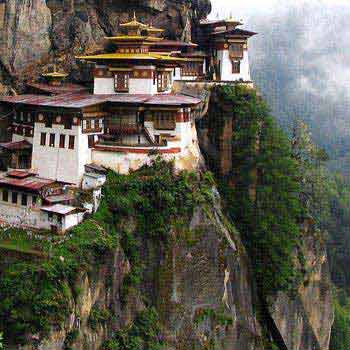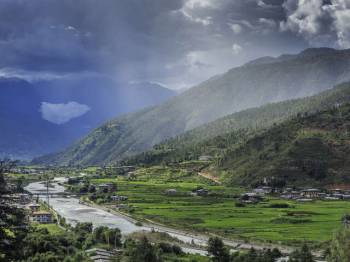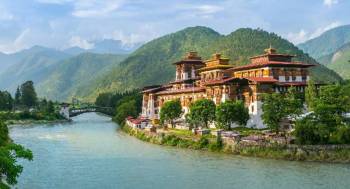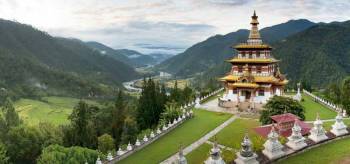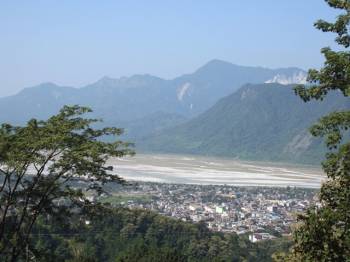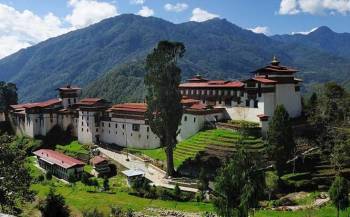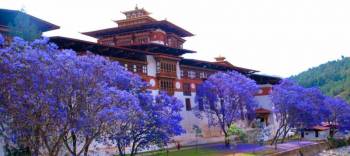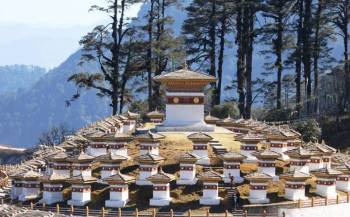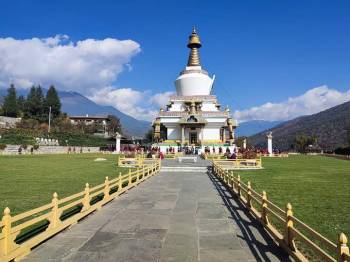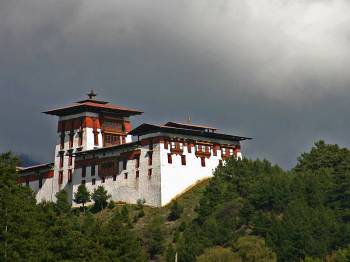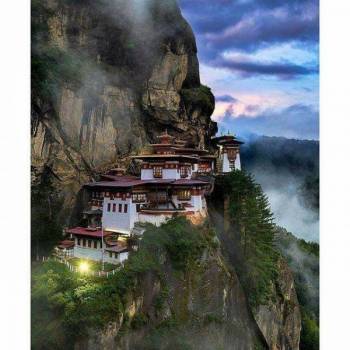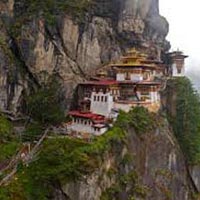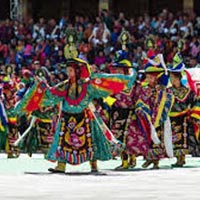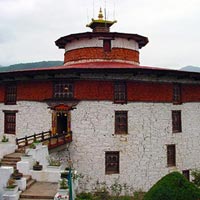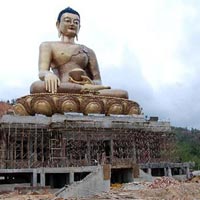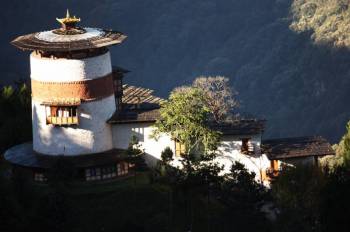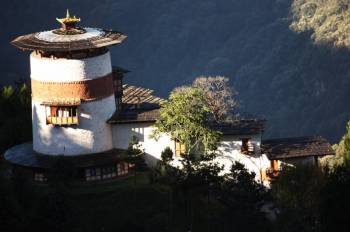Land of Happiness Tour
Duration : 8 Nights / 9 Days
Destination Covered : Paro, Punakha, Trongsa
Tour Activities : Heritage, Hill Stations & Valleys, Hill Stations & Valleys
Price on Request
Paro, Punakha and Trongsa Tour Overview
Bhutan has introduced the domestic flights between Paro, Bumthang and Yonphula (Trashigang). However, the maintenance of Air strips at Yonphula Domestic Airport that will go until 2013 have compelled the travelers to follow the travel by vehicle. Until 2015, the trip will be of 16 days and there on, you can reduce the duration of the trek to 15 days if you use the domestic flight to Trashigang from Paro International Airport.Flight ticket
Any drinks in tourist standard restaurant or hotel. Personal expenses Tips for the guide and diver.
Paro, Punakha and Trongsa Tour Itinerary
Then you will visit one of the clusters of farm houses in Paro Valley and a visit to a farm house offers a good glimpse into the lifestyle of a farmer.
In the evening drive up the Paro valley to visit Drukgyel Dzong (in ruins), 18 km. from Paro town on the north side of the valley.It was built in 1649 to commemorate the victory of Bhutanese over allied Tibetan-Monolian forces. The Dzong as a defence fortress is said to have housed the finest armoury in the country.
Dinner & overnight at a hotel in Paro.
After breakfast, you will travel to Punakha & Wangdue which will take you through Chunzom (confluence of Pachu- the river flowing through Paro valley & Wangchu –the river flowing through Thimphu valley). On the way, visit Tachog Lhakhang (temple) , this 14th century temple located on the base of a mountain across the Pa chu on the Paro-Thimphu highway, is a must visit temple in the Paro valley. Built by the great master architect Thangtong Gyalpo, the temple houses some unique statues. To get to the temple one may actually walk over the iron chains that spans over the Pa chu.
After crossing Chunzom, the drive will take you along the Wangchu upto Simtokha where road diversion leads you to Punakha/Wangdue through Dochula Pass (3,088m). In the clear spring sky, you can enjoy the panoramic view of the Himalayan Mountain ranges. At Dochula Pass you will see the beautiful 108 chortens (stupa) built on the hill by Ashi Dorji Wangmo Wangchuck (the Queen Mother of Bhutan) for the security and well being of His Majesty, the King of Bhutan. You will also visit Druk Wangyal Lhakhang (temple) .The temple was built to honor His Majesty Jigme Singye Wangchuck (the 4th King of Bhutan). The past and future appear to merge in the details of the temple that tells the story of a supreme warrior figure whose vision pierces the distant future.
After refreshment at Dochula Pass Resort you will continue your journey to Punakha. Punakha has been inextricably linked to some of the most momentous events in the Bhutanese history and deserves its reputation as one of the most beautiful and significant regions at the heart of Bhutanese culture. Punakha had served as the capital of Bhutan from 1637 till 1907 and the 1st National Assembly was held here. Punakha Dzong (fortress) is historically important and stands as the symbol for a unified Bhutan.
You will stop at Lobesa Village to visit the Devine Madman’s Monastery-Chhimi Lhakhang, famously known for its fertility shrine, where one can receive a special fertility blessing. After lunch at Lobesa Village you will visit the Punakha Dzong, located on the island of the Pho - Chu (male river) and the Mochu (female river). The dzong was built in 1637 by Zhabdrung Ngawang Namgyal (high Drupa Kagyu lama who unified the warring valley kingdoms under a single rule in 16th century) to serve as the religious and administrative seat of the region. It was here that the dual system of government was introduced in the 17th century and in 1907, enthroned the first King Gongsar Ugyen Wangchuck. Damaged over the centuries by four catastrophic fires and an earthquake, the dzong has been fully restored in the recent years by the 4th King Jigme Singye Wangchuck. At the dzong, you can see the highest standards in woodwork. Also visit the massive Kuenray, the Coronation Hall of all Bhutanese kings, the Dzongchung at the entrance to the dzong and the cantilever bridge over the Mochu that has been recently renovated.
Dinner & overnight at a hotel in Punakha.
After breakfast, travel to Bumthang through Trongsa.The drive will take you through dense forests of oak and blue pine trees and through the subtropical vegetation. The journey will also take you through the village of Nobding and Pele la pass (3300m). Throughout your trip you will come across the beautiful sceneries of rural Bhutan, with scattered settlements far from the road which makes for good photographing. You will also pass through open meadows, and valley of yak herders and several other villages via Chendebji Chorten ( Stupa) . Lunch and refreshments will be served enroute. On arrival at Trongsa, you will visit National Museum which is housed in the Ta Dzong (watch tower).A museum in which aspects of Bhutanese culture and history are explained by beautifully objects. Documentary will be shown too which explains a great deal about Bhutanese history and history of monarchy.
After that you will continue your journey to Bumthang passing through Yotong La Pass (3400 m). Just before reaching Bumthang you will come across “Yathra” Weaving Centre at Zugney Village where you will see local weavers weaving Yathra. Yathra is the name for the colorful, hand-woven woolen cloth (often with geometric designs) that is produced in this region and wool used for this type of textile is sheep wool as the sheep is reared in this Bumthang Valley. Yathra is made into jackets or bags, etc.
Then you will be driven further to Bumthang Valley. On arrival at Bumthang, check into your hotel in Bumthang.
Dinner and overnight at a hotel in Bumthang.
Jambay Lhakhang, built in the 7th century by the King Songtsen Goempo of Tibet. In his effort to propagate Buddhism he had a plan to build a total of 108 temples in Tibet and neighboring kingdoms.
Kujey Lhakhang (Kujey means, "Body imprint"). The temple to the right is the oldest and was built by Minjur Tempa in 1652. It was built around the cave in which Guru Rimpoche meditated and left his body imprint.
Jakar Dzong, "castle of the white bird". According to legend, when the lamas assembled in about 1549 to select a site for a monastery, a big white bird rose suddenly in the air and settled on a spur of a hill. This was interpreted as an important omen, and the hill was chosen as the site for a monastery and for Jakar Dzong. The fortress is now used as an administrative center of the valley and summer residence of Trongsa monks.
Tamshing Lhakhang: This temple is also known as Tamshing Lhendrup Chholing (Temple of the Good Message). In the evening stroll around the beautiful landscape of the Bumthang Jakar valley
After lunch drive to Mebar Tsho ( Burning lake) and visit the lake and then drive back to your hotel and in the evening you may wish to stroll around the beautiful landscaped gardens of Bumthang.
In the evening you may wish to stroll around the beautiful landscaped gardens of Bumthang.
Dinner & overnight at a hotel in Bumthang.
After breakfast, drive to Punakha via Phobjikha valley. Driving through the dense forests of the Phobjikha Valley you arrive at Gantey village where you see the Gangtey Monastery and visit the monastery. Phobjikha valley is part of the beautiful Jigme Singye Wangchuck National Park ( formerly known as Black Mountains National Park), one of Bhutan’s most important nature sanctuaries. Each winter it is home to a flock of 300 rare and endangered black-necked cranes. The surrounding hills and mountains are home to nomadic shepherds and yak-herders. This is one of the most remote and untouched regions in Bhutan and is only just opening its doors to the outside world.
After lunch at Phobjikha valley and explore the valley and also visit the Black Necked Crane Center.
Then drive onto Punakha/Wangdue. Dinner & overnight at a hotel in Punakha/Wangdue.
After breakfast you will be driven to Thimphu and After lunch visit the following
Centenary Farmers’ Market (open from Thu-Sun only): Most of the Thimphu’s population and many valley dwellers converge on the bustling weekend market, held by the side of Wangchu River. A wide range of foodstuffs and local arts and crafts are sold at the market, which runs from Friday afternoon till Sunday evening. A visit to the market provides great photo opportunities, as well as the chance to mingle with local people.
Takin Preserve, which houses the national animal the Takin that is only found in Bhutan. This is an extremely rare member of the goat family. Found in herds in the very high altitudes (13,125ft and over). They live on a diet of grass and bamboo. It can weigh as much as 550 pounds.
Watch Archery match ( Bhutan’s national game)
Tashichhoe Dzong, a fortress of the glorious religion. It was built in 1641 by Zhabdrung Ngawang Namgyel and was reconstructed into present structure by the late King, His majesty Jigme Dorji Wangchuck in the year 1962-1969. It houses the secretariat building, the throne room and the office of the king, and the central monk body.
The National Memorial Chorten (stupa) which was constructed in 1974 as a memorial for the third King of Bhutan, King Jigme Dorji Wangchuck, who is widely regarded as the father of modern Bhutan. The term ‘chorten’ literally means ' seat of faith' and Buddhists often call such monuments the 'Mind of Buddha'. Meet the elderly generation in circumambulation, especially in the evenings, at the National Memorial Chorten.
Craft Bazaar where craftsmen and artisans from across the country display and sell their handicrafts.
Dinner & overnight at a hotel in Thimphu.
Traditional Bhutanese paper making factory. The handmade paper making in Bhutan stemmed from the age old tradition originated in 8th century of Bhutanese history. The handmade paper constitutes as valuable National heritage of Bhutanese cultural identity and is preserved through all the ages. The Traditional paper is recognized and held high esteem both in home and outside world. Jungshi Paper Factory was established in November 1990 as an undertaking of the Royal Government of Bhutan. The unit now boasts as a major and sole dealer in handmade paper and its products.
National Textile Museum which is a good place to see the art of traditional weaving being kept alive and preserved through exhibition and has a good collection of old textiles which are rich in colors and designs.You will also see people weaving with intricate designs.
National Institute of Traditional Medicine , where medicinal herbs are compounded and dispensed, and traditional medical practitioners trained.
School of Traditional Painting of Arts and Crafts where students undertake a six-year course on the 13 traditional arts and crafts of Bhutan.
After lunch drive for about 30 minutes to the base camp of Tango Monastery and hike up to the Monastery. The walk up to the Monastery is through the forest filled with Rhododendron flower trees which will be in full bloom during April month. Tango Monastery is the center for higher studies for monks. The view from Tango Monastery is breathtakingly beautiful. You will experience complete peace and serenity in this area. After visiting the monastery, walk back to the road and then drive back to Thimphu .
Dinner & overnight at a hotel in Thimphu.
In the evening you can relax in the Traditional Bhutanese Hotstone bath.
Dinner & overnight at a hotel in Paro.
More Details about Paro, Punakha and Trongsa Tour
Inclusions
- Hotel
- Sightseeing
- Visa fees
- Royalty and surcharges
- Accommodation in TOP 3* Hotels/Resorts, Transportation and sightseeing as per itinerary, All permits and taxes included, All fees to museums, monuments, and cultural sits,
- Permits to enter old monasteries and Taxes,
- Licensed English speaking guide.
- All three meals included.
- SUV or standard duty car for sightseeing and pick-drop
Exclusions
- Flight ticket
- Any drinks in tourist standard restaurant or hotel. Personal expenses Tips for the guide and diver.
Terms & Conditions
CANCELLATIONS -
- Tour Programs booked and subsequently cancelled shall be subject to cancellation charges as follows:
- within 30 days of start of program – no charges
- within 21 days – 10% of rate
- within 14 days – 15% of rate
- within 7 days – 30% of rate
- less than 7 days or without notice – 50% of rate
DELAYED ARRIVALS -
- There is no charge for delays in arrival and departure because of weather conditions disrupting flights or road blocks. The tourist must however bear the cost of food, accommodation, transportation, and other services required.

